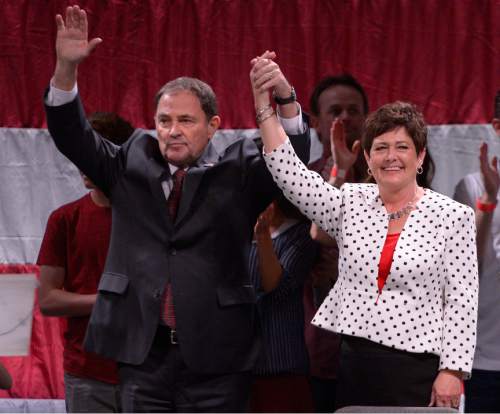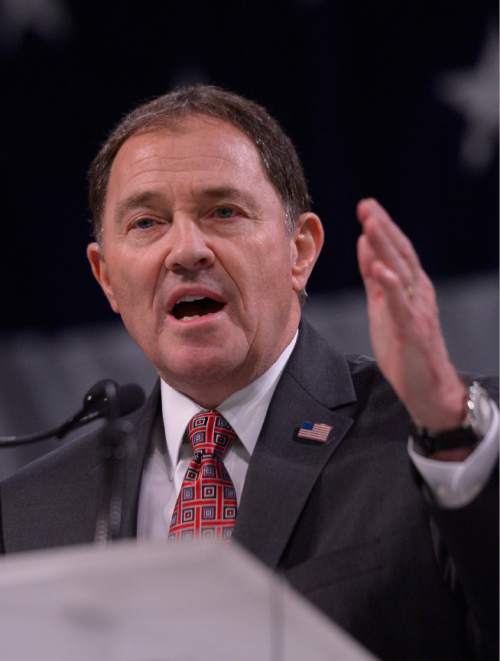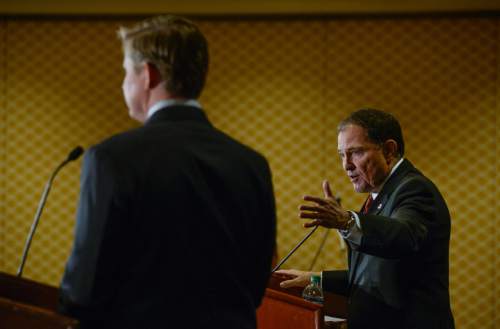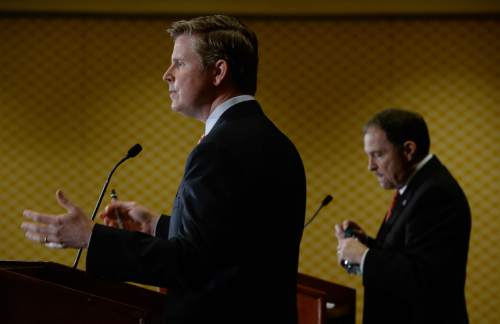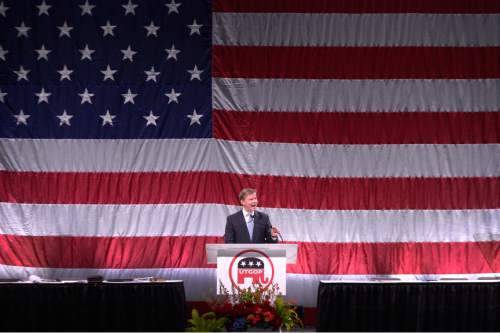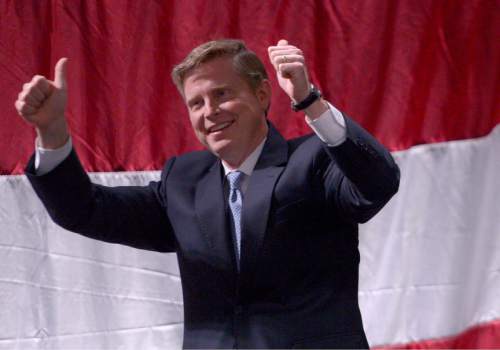This is an archived article that was published on sltrib.com in 2016, and information in the article may be outdated. It is provided only for personal research purposes and may not be reprinted.
Republican challenger Jonathan Johnson is ratcheting up the rhetoric, calling Gov. Gary Herbert a "coward" for refusing to debate him before next week's GOP primary.
"This is what Utah voters want and deserve — to hear a robust discussion of our ideas for the future, have us defend our positions. They want to see us act under pressure," Johnson said in an online video taking on the governor. "I think you're a coward. I think you've proven yourself to be a coward on this issue."
Although Herbert said repeatedly in the past several weeks he was confident that their would be a primary debate, his camp now says it is too late and the governor too busy for such a showdown to take place.
"Gov. Herbert is campaigning throughout the state, community by community, to take his message personally to the people," said campaign manager Marty Carpenter. "Early voting is already underway across the state, absentee ballots have been distributed and voters in 20 of our state's 29 counties have been casting ballots by mail since early this month. At this late stage in the calendar, the governor simply cannot cancel previously scheduled campaign events across the state in order to accommodate yet another debate."
There has been one debate, before the state GOP convention, between the two candidates. They also spoke at two separate forums — one before the convention and one just after — although there was no interaction between the two or questions of the candidates.
It will mark the first time in more than four decades, and possibly longer, that competing candidates for one of Utah's top statewide offices — governor, U.S. senator or attorney general — have not squared off between the convention and the primary.
Johnson has tried to goad Herbert into a series of debates, dating back to last August when he announced his candidacy for governor.
Herbert has been invited to debate Johnson by several media outlets, and 21 chairs of Utah's rural county Republican parties sent a letter to the governor asking for a string of debates. Herbert has declined.
The governor has spent the past several days traveling the state, flipping pancakes at an elementary school, participating in the Strawberry Days Parade in Pleasant Grove, and stopping for a drink and photos at the Swizzle Soda Shop in Delta.
"The governor has worked extremely hard to fulfill his commitment to help voters understand his public record," Carpenter said, "and to give them opportunities to contrast his opponent's positions with his own."
University of Utah political science professor Tim Chambless said he planned to moderate a debate hosted by the AFL-CIO between the two Republican gubernatorial candidates and Democrat Mike Weinholtz on Friday, but discovered Herbert hadn't RSVP'd for the event and didn't expect to attend.
"I believe in debates. I believe in inclusion, because the taxpayers are paying for this process and they are looking for the public servant who will serve the public well," Chambless said. "Having said that, when it comes to a political campaign, we know that incumbents, when they're well ahead by double digits, they're afraid of making a mistake. In contrast, challengers want as many debates as possible ... to catch up and win."
A recent poll by The Salt Lake Tribune and the Hinckley Institute of Politics showed Herbert holding a 45-point lead over Johnson. A poll released Monday by UtahPolicy.com gave the governor a 38-point edge.
Dan Liljenquist, a former state senator debated Sen. Orrin Hatch three times — twice before the convention and once before the primary — when he ran against the longtime U.S. senator in 2012. He challenged Hatch to many more.
"Robust public debate is critical to the political process," the former lawmaker said.
A member of the Utah Debate Commission, which organizes debates for the general election, Liljenquist said that, in the future, the commission should expand its scope and stage primary debates as well.
"We made a decision not to have the primary [debate]. One reason was financial and, two, was trying to balance between the Republicans and Democrats," said the commission's co-chairman, former state Sen. Scott Howell.
The nonpartisan group struggled with whether it was fair to give the Republican candidates a forum to debate and not the Democratic challenger, or if it then would have to hold a similar matchup for the contestants in the Democratic U.S. Senate primary.
Johnson's campaign manager, Dave Hansen, said Herbert has been dishonest with voters by putting off calls for debates time and again, then asserting it's too late in the process to have them.
"The real losers in this whole thing are the voters, who would've had an opportunity to see these two people vying for the job of leading the state," Hansen said. "If the governor doesn't feel confident enough in the positions he's taken, then obviously he doesn't want to have anyone question him in person."
Twitter: @RobertGehrke


